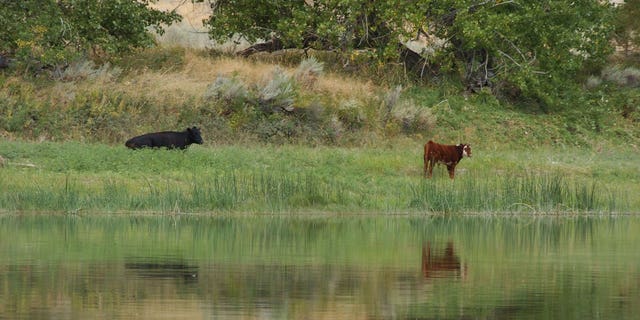A Biden administration proposal that would lock up federal land and block traditional uses of public land like energy development is facing stiff opposition from a wide range of stakeholders.
In March, the Bureau of Land Management (BLM) unveiled federal regulations that would allow environmental organizations that are opposed to fossil fuel drilling and mining projects to lease land for conservation uses, thereby blocking resource development. The agency extended its public comment period for the rule until Wednesday and has received more than 170,000 comments.
“What you’ve got now is BLM trying to shove through another overarching, sweeping rule that’s not supported by the Federal Land Policy and Management Act,” Montana Attorney General Austin Knudsen told Fox News Digital in an interview. “They’re trying to argue that conservation now somehow fits within the definition of uses under the Federal Land Policy and Management Act and trying to do it by rule.”
“It’s just flagrantly in violation of federal law. But they’re trying to do it on the sly,” he continued. “They can’t get done what they want done in Congress and through the Senate, so they try to do it via rule.”
BIDEN’S LATEST ECO REGS BLASTED BY SMALL BUSINESSES, MANUFACTURERS: ‘WILL DO TERRIBLE DAMAGE’
Knudsen added that the proposal represents a broad policy change that should come through legislation, not BLM regulations. He suggested the proposal is also in violation of the Administrative Procedure Act, a 1946 law that requires federal agencies to provide sufficient reasoning for regulations they implement.
Knudsen joined letters led by other state attorneys general in opposition to the proposal. The comment letters from him and the other top law enforcement officials stated the BLM action would substantially harm the energy, mining, agriculture and cattle industries while violating the Federal Land Policy and Management Act (FLPMA) of 1976.
Under FLPMA, Congress established BLM’s so-called “multiple-use” and sustained yield mandate. The statute requires the BLM to open the lands it manages to various uses including energy development, grazing, recreation and mining.
BIDEN ADMINISTRATION RIGGED INTERNAL ANALYSIS, SOFTENING BLOW OF POWER PLANT REGULATIONS: REPORT
The BLM action seeks to put conservation “on equal footing” with other uses, and the agency said it would improve the climate change resilience of public lands, conserve wildlife habitats and landscapes and preserve cultural and natural resources on public lands. Under the rule, organizations would be allowed to bid on land to conduct specific restoration or mitigation activities on.
“Uses are all defined in FLPMA. Nowhere in there does the term conservation — conservation is basically non-use,” Knudsen said. “So what this would amount to is locking up swaths of federal land for ‘conservation.’ That’s not an approved use under the law. If you want to do that, fine. Go to Congress, pass the bill, get the president to sign it. But they know they don’t have the juice to do that.”

In addition to Knudsen and several other attorneys general, various industry groups have also weighed in and opposed the proposal during its comment period.
For example, mining groups National Mining Association (NMA) and American Exploration & Mining Association (AEMA), local cattlemen’s associations, farmers’ groups and oil industry organizations submitted comments expressing concern about the rule.
WHITE HOUSE ECO COUNCIL AT ODDS OVER TECHNOLOGY CENTRAL TO BIDEN’S GREEN GOALS
“In our view, the proposal represents a fundamental shift in the way BLM currently manages federal lands under the Federal Land Policy and Management Act’s (FLPMA) multiple use mandate,” NMA counsel Katie Mills wrote to the BLM. “The potential impacts on NMA’s members that conduct mining operations or other activities on federal lands are significant.”
“The Proposed Rule is illegal and should be withdrawn immediately. While the Proposed Rule pays lip service to [FLPMA] as amended, it fundamentally violates FLPMA in multiple ways, including illegally adding ‘conservation’ as a ‘use’ when Congress did not include it in FLPMA’s specific list of uses,” AEMA Executive Director Mark Compton wrote in a separate letter.
The Nevada Farm Bureau Federation said the rule should be withdrawn and expressed concern about its potential impact on small businesses including ranchers who depend on public lands.

The South Dakota Cattlemen’s Association similarly wrote that BLM’s proposal was “developed with no stakeholder involvement or awareness.” It argued BLM should rescind the rule until it consults producers — it noted farmers and ranchers are the original conservationists — who will be impacted by it.
“In light of the numerous legal infirmities and substantial policy concerns for implementation, IPANM respectfully requests that BLM withdraw and reconsider the proposed Planning Rule,” Independent Petroleum Association of New Mexico (IPANM) Executive Director Jim Winchester wrote in a comment letter.
“BLM should refocus its efforts on facilitating multiple use of the public lands within the confines of its Congressionally delegated FLPMA planning authority, ACEC designation, and wilderness withdrawals,” he continued. “To the extent BLM proceeds with the rulemaking, it must remove any allowance for conservation leasing.”
In another letter, the Montana Electric Cooperatives’ Association, which represents large electricity providers in the state, said the rule could ultimately prevent electricity infrastructure development, potentially hurting renewable energy sources.
Read the full article here